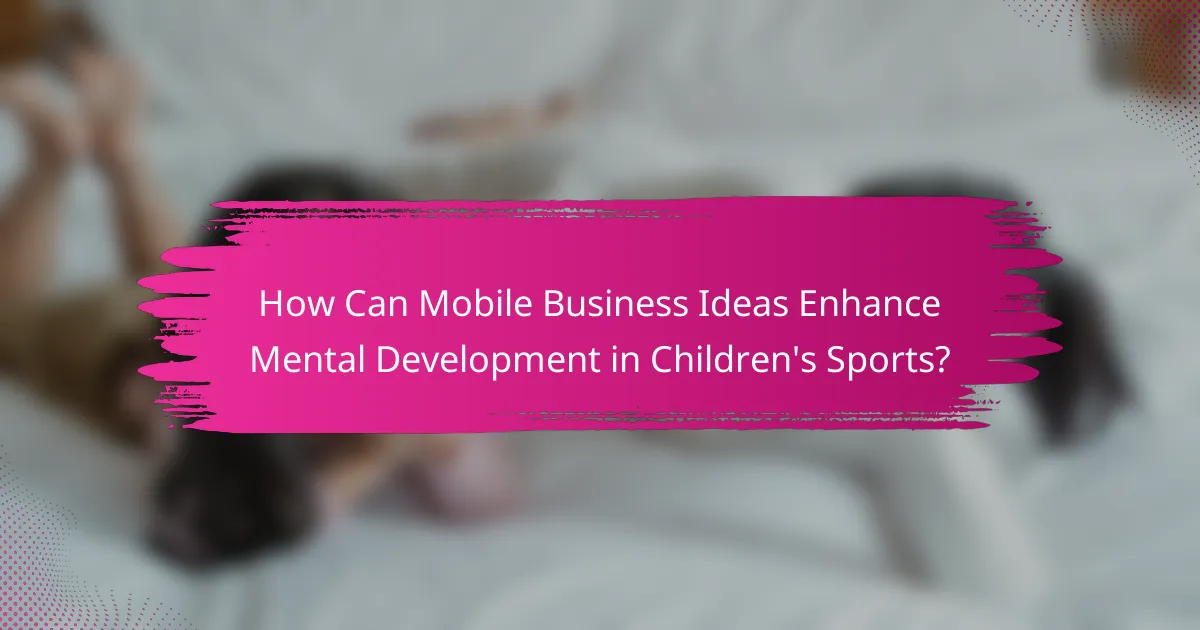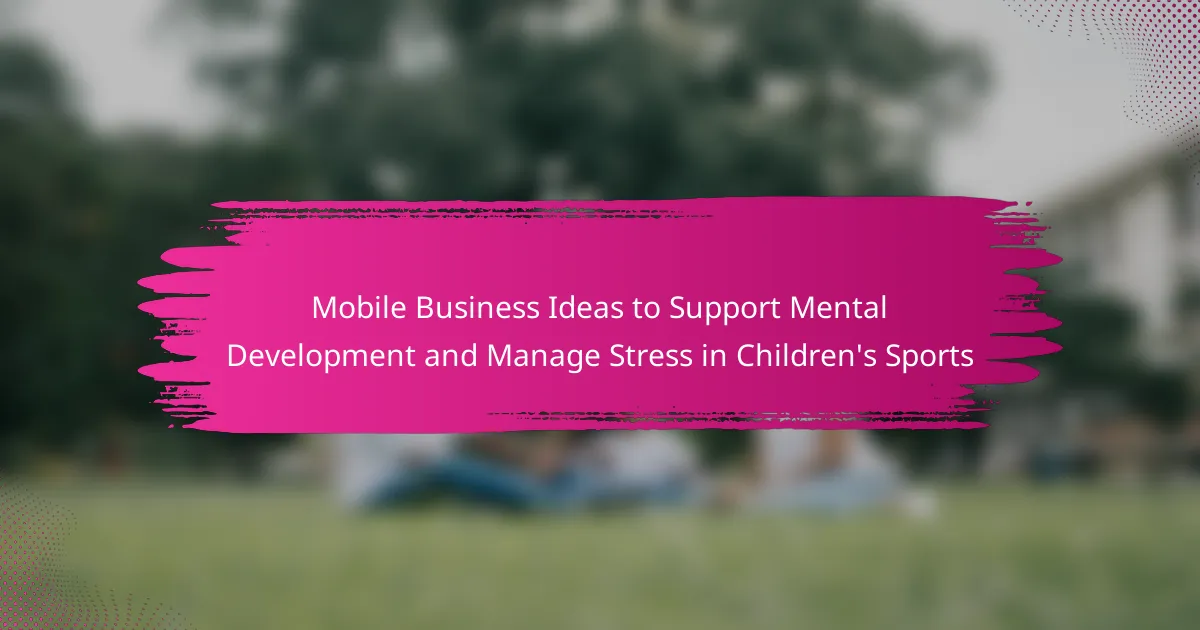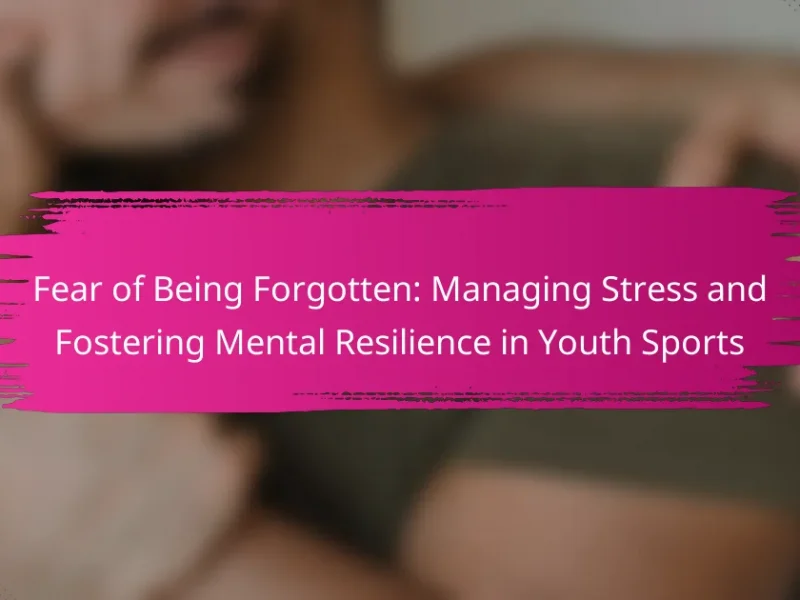Mobile business ideas can enhance mental development and manage stress in children’s sports. These concepts include interactive apps for cognitive skills, mindfulness exercises for focus, and virtual coaching for personalised feedback. Additionally, tailored mental support services like workshops and stress management tools can foster emotional growth. Understanding cultural attitudes is crucial for effective engagement and participation in these initiatives.

How Can Mobile Business Ideas Enhance Mental Development in Children’s Sports?
Mobile business ideas can significantly enhance mental development in children’s sports by providing innovative tools and resources. These ideas often focus on interactive apps that promote cognitive skills, such as decision-making and strategic thinking. For example, gamified training programmes encourage children to engage with sports while developing problem-solving abilities.
Additionally, mobile platforms can offer mindfulness exercises tailored for young athletes, helping them manage stress and improve focus. Research indicates that mental resilience is crucial for performance, and these tools can foster a positive mindset.
Moreover, virtual coaching applications can provide personalised feedback, enabling children to reflect on their performance and set goals. This self-assessment process enhances critical thinking and self-awareness, essential components of mental development in sports.
In summary, mobile business ideas serve as valuable resources that not only support athletic skills but also nurture the mental growth of children involved in sports.
What are the key benefits of mental development in young athletes?
Mental development in young athletes enhances focus, resilience, and teamwork. These benefits lead to improved performance and better stress management. Programmes that incorporate mental training can foster emotional intelligence, which supports athletes in navigating competitive pressures. Research indicates that athletes with strong mental skills exhibit greater consistency and lower anxiety levels during competitions.
Which mobile solutions are most effective for promoting mental growth?
Mobile applications that focus on mindfulness, cognitive games, and stress management are most effective for promoting mental growth in children’s sports. These solutions enhance focus, emotional regulation, and resilience.
Mindfulness apps, for example, teach children techniques to manage stress and improve concentration. Cognitive games stimulate critical thinking and decision-making skills, essential for sports performance. Stress management tools provide strategies for coping with competition pressure, fostering a healthy mindset.
Research indicates that consistent use of these mobile solutions can lead to improved mental well-being and better sports outcomes. As a result, integrating technology into youth sports can significantly support mental development.
What features should mobile apps include for optimal mental development?
Mobile apps for children’s sports should include features that promote mental development and stress management. Essential features are interactive games that enhance cognitive skills, mindfulness exercises for emotional regulation, goal-setting tools to foster motivation, and progress tracking to visualise achievements. These elements support a holistic approach to mental health in sports.
How can gamification be utilised in mobile platforms?
Gamification can enhance mobile platforms by engaging children through interactive sports-related activities. It promotes mental development and stress management by incorporating game-like elements such as rewards, challenges, and progress tracking. This approach fosters motivation and improves learning outcomes in sports. Engaging features can include leaderboards, achievement badges, and personalised feedback, which collectively enhance user experience and retention.

What Unique Approaches Can Mobile Businesses Take to Manage Stress in Children’s Sports?
Mobile businesses can adopt unique approaches to manage stress in children’s sports by providing tailored mental support services. These services may include mobile mindfulness workshops, virtual coaching sessions, and stress management apps specifically designed for young athletes. For example, offering interactive workshops that teach relaxation techniques can help children cope with competitive pressures. Additionally, mobile businesses can collaborate with sports organisations to implement educational programmes that emphasise mental well-being alongside physical training. As a result, children receive comprehensive support that fosters both their athletic and emotional development.
How can mobile tools help in recognising stress signals in young athletes?
Mobile tools can effectively identify stress signals in young athletes by providing real-time monitoring and feedback. These applications can track physiological indicators like heart rate and sleep patterns, enabling coaches and parents to recognise early signs of stress. Additionally, mobile platforms can facilitate communication, allowing athletes to express their feelings and concerns, fostering a supportive environment. Data analytics within these tools can highlight patterns over time, helping to develop personalised strategies for stress management. By integrating these features, mobile tools play a crucial role in promoting mental well-being in children’s sports.
What innovative mobile services support stress management?
Mobile services like mindfulness apps, virtual coaching, and interactive games enhance stress management in children’s sports. These innovations provide engaging ways to cultivate mental resilience and focus. For instance, apps offering guided breathing exercises help children learn relaxation techniques. Additionally, platforms that connect young athletes with sports psychologists promote emotional well-being. Integrating gamified elements can also make stress management enjoyable, encouraging consistent use. Overall, these services support mental development and create a balanced sports experience.
How can virtual coaching be integrated into mobile applications?
Integrating virtual coaching into mobile applications enhances children’s sports mental development and stress management. This can be achieved through personalised coaching sessions, interactive feedback, and gamified progress tracking.
Mobile apps can utilise video calls for real-time coaching, allowing children to engage with experts regardless of location. Additionally, incorporating AI-driven analytics can provide tailored insights on performance and mental well-being.
Features like mindfulness exercises and stress-relief activities can be embedded to support emotional health. Regular progress updates and motivational notifications can keep children engaged and focused on their mental development goals.
Overall, virtual coaching in mobile applications offers a unique attribute of accessibility, making mental support readily available for young athletes.
What role do mindfulness and relaxation exercises play in mobile platforms?
Mindfulness and relaxation exercises play a crucial role in mobile platforms by providing accessible tools for stress management in children’s sports. These exercises enhance focus, reduce anxiety, and improve overall mental well-being. Mobile applications can offer guided sessions, reminders, and progress tracking, making it easier for young athletes to integrate mindfulness into their routines. Studies show that regular practice can lead to improved performance and emotional regulation, ultimately supporting mental development in sports contexts.

What Rare Attributes Should Mobile Businesses Focus on for Children’s Mental Health?
Mobile businesses should focus on unique attributes like interactive engagement, personalised feedback, and emotional intelligence training for children’s mental health. These attributes enhance mental development and stress management in sports. For example, apps that offer real-time performance analytics can help children understand their emotions during competition. Additionally, incorporating mindfulness exercises into mobile platforms supports emotional regulation. Prioritising these rare attributes can create impactful tools that foster resilience and well-being in young athletes.
How can personalised mental health assessments be implemented in apps?
Personalised mental health assessments can be implemented in apps through tailored questionnaires and data analytics. These assessments adapt to individual user needs based on responses and behavioural patterns. Incorporating machine learning algorithms enhances accuracy by analysing user interactions and feedback. Regular updates to assessment criteria ensure relevance, fostering ongoing engagement and support for children’s mental development in sports.
What unique partnerships can enhance mobile offerings in children’s sports?
Collaborative partnerships with educational organisations and mental health professionals can significantly enhance mobile offerings in children’s sports. These alliances can provide resources for mental development, stress management, and emotional support. For example, integrating mindfulness training apps or interactive learning modules can foster resilience and focus among young athletes. Additionally, partnerships with sports academies can offer tailored content that aligns with skill development while promoting mental well-being. Engaging parents through mobile platforms can further support children’s emotional health, creating a comprehensive ecosystem for their growth in sports.
How can collaboration with educational institutions improve app effectiveness?
Collaboration with educational institutions enhances app effectiveness by integrating expert insights and research-based methodologies. Educational partnerships can provide access to developmental psychology, helping to tailor features that promote mental growth and stress management in children’s sports. This collaboration ensures content relevance and fosters user engagement through evidence-based practices. Additionally, institutions can facilitate user testing, offering feedback that informs iterative design improvements.
What are the benefits of integrating sports psychologists into mobile services?
Integrating sports psychologists into mobile services offers significant benefits for mental development and stress management in children’s sports. These professionals provide tailored mental strategies, improving focus and resilience.
They enhance emotional regulation, helping young athletes cope with competitive pressures. Mobile access allows for real-time support, promoting continuous engagement and practice of mental skills. Furthermore, sports psychologists can design interactive programmes that address unique challenges faced by children in sports, fostering a holistic approach to their development.
Research indicates that mental training can lead to improved performance and well-being, making these services essential in modern youth sports.

How Do Cultural Attitudes Impact Mobile Business Strategies for Children’s Sports?
Cultural attitudes significantly shape mobile business strategies for children’s sports by influencing engagement and participation. Understanding local values can guide app features that promote mental development and stress management. For instance, communities valuing teamwork may prefer platforms that foster collaboration among young athletes. Additionally, cultural perceptions of competition can dictate how stress management resources are integrated into mobile solutions. Adapting to these attitudes ensures that strategies resonate with parents and children, enhancing user experience and effectiveness.
What local trends influence mobile app usage among young athletes?
Local trends significantly impact mobile app usage among young athletes by enhancing their mental development and stress management. Increased smartphone penetration and social media engagement encourage the adoption of apps that promote mindfulness and emotional resilience. Local sports culture fosters a community-driven approach, where apps can facilitate peer support and shared experiences. Additionally, schools and sports organisations increasingly integrate technology into training, leading to higher app usage for performance tracking and mental health resources. These trends reflect a growing recognition of the importance of mental well-being in sports.
How can businesses adapt their offerings to align with community values?
Businesses can adapt their offerings by integrating community values into their mobile business ideas. For instance, they can focus on mental development and stress management in children’s sports through tailored programmes that emphasise emotional well-being. Collaborating with local organisations can enhance credibility and foster trust. Additionally, incorporating feedback from parents and coaches ensures that the services align with community expectations. Utilising technology, such as apps for mindfulness and skill development, can further engage families and promote a supportive environment. This approach not only meets the community’s needs but also enhances business sustainability.

What Best Practices Should Mobile Businesses Follow for Success in This Niche?
Mobile businesses should prioritise engaging activities, mental health support, and flexible scheduling for success in children’s sports. Incorporating gamified learning can enhance mental development while managing stress. Offering workshops on coping strategies can also attract parents. Building partnerships with schools can expand reach and credibility. Regular feedback from parents and coaches will refine services.
What common mistakes should be avoided when developing mobile solutions?
To develop effective mobile solutions for children’s sports, avoid these common mistakes. Failing to prioritise user experience can lead to low engagement. Neglecting to conduct thorough market research may result in misaligned features. Overcomplicating the interface can deter young users. Ignoring feedback from parents and coaches can limit improvements. Lastly, underestimating the importance of data privacy can damage trust.
How can businesses continuously engage with their audience for feedback?
To continuously engage with their audience for feedback, businesses should implement regular communication channels. Utilising mobile apps can facilitate real-time feedback collection during children’s sports activities.
Incorporating features like surveys and polls within these apps allows for immediate responses. Analysing data from these interactions helps businesses adapt their offerings to better meet audience needs.
Additionally, hosting interactive sessions or webinars fosters community engagement and encourages open dialogue. This approach not only strengthens the relationship but also enhances service quality based on direct input.
Finally, leveraging social media platforms can provide a space for ongoing conversations and feedback, ensuring a continuous loop of engagement and improvement.
What strategies can ensure the longevity and relevance of mobile services?
To ensure longevity and relevance of mobile services, focus on user engagement, continuous innovation, and adaptability. Prioritise features that enhance mental development and stress management in children’s sports. Regularly update content and functionalities based on user feedback to maintain interest. Leverage data analytics to understand user behaviour and adjust offerings accordingly. Collaborate with experts in child psychology and sports to enrich service quality.
How can businesses measure the impact of their mobile solutions on mental development and stress management?
Businesses can measure the impact of mobile solutions on mental development and stress management through user feedback and performance metrics. Collecting data on engagement levels, stress reduction, and skill improvement can provide insights into effectiveness. Surveys and assessments can evaluate children’s mental health and emotional responses. Additionally, tracking participation rates in sports and related activities can highlight the benefits of mobile solutions. Implementing analytics tools can further quantify these impacts, offering a clear view of how mobile solutions contribute to mental well-being in children’s sports.


